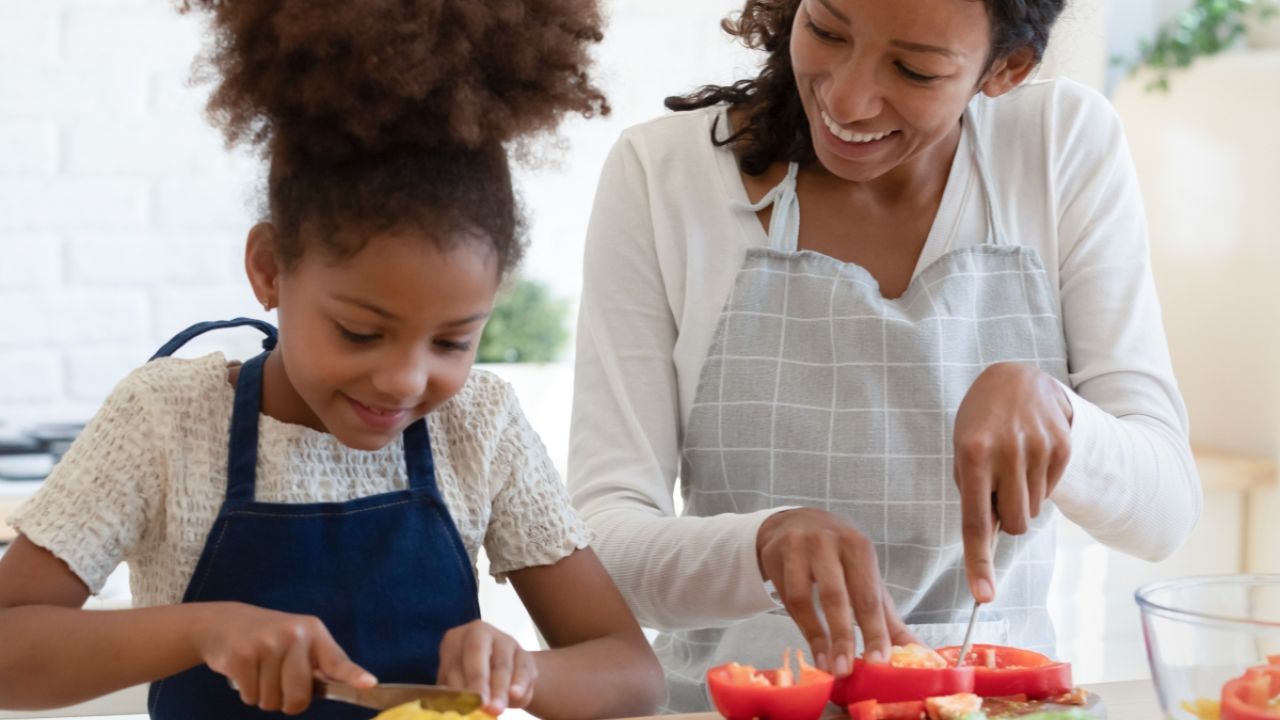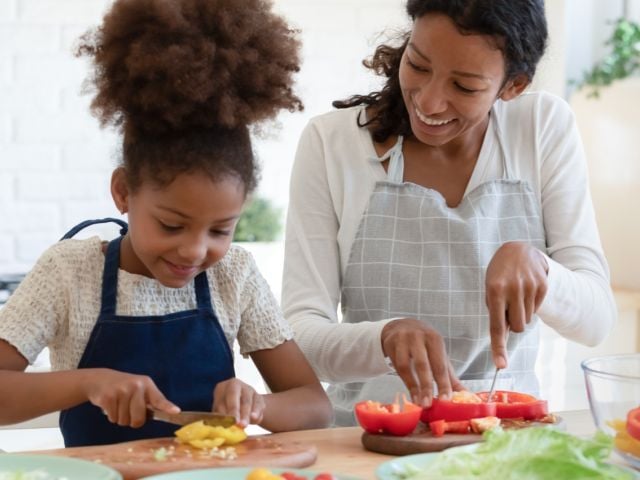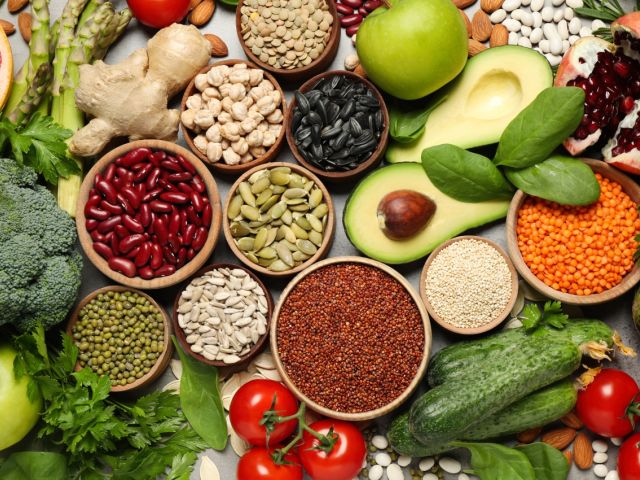
EWG presents the last in a series of guest articles by Culinary Nutritionist and Author of “What the Fork Are You Eating?” Stefanie Sacks, exploring the link between a healthier diet and a healthier environment while offering straightforward advice and encouragement to anyone looking to improve their nutrition and protect the planet.
Asking you to consider shifting what and how you eat is the goal of my recent series of blogs on how to embrace a more plant-centered food lifestyle. I hope you now have just enough tools to begin to reshape your choices, including a small repertoire of meatless recipes.
Adopting new habits, particularly around nourishment, is a big ask. But after over 20 years of guiding people towards healthier food choices, I know it’s doable with a little inspiration, the right information, and engaging activities that are accessible, simple and fun.
That’s why I cook! And teach others to do the same. It has been my passion since I was very young – a place where I could be free to create, exploring the many colors, textures and flavors of food. I rarely use recipes to guide me, but always seek inspiration from other culinarians.
As you embark on your journey, here are some plant-rich resources that have either been my go-to choices, or that pique my interest. I’ve woven them in with highlights from my blog series on cooking with plant-based foods.
Sometimes, just getting in the kitchen with a recipe that resonates is a great start. Remember, the slower you go, the faster you get there. So bite off only what you feel you can chew!
Hailing from the country’s very first health-supportive culinary school (and my alma mater), the Natural Gourmet Institute for Health and Culinary Arts, The Complete Vegan Cookbook compiles more than 150 plant-based recipes and techniques that are the foundation of how and what we learned in the school’s chefs training program. It’s truly a comprehensive natural foods bible founded in principles from food and healing pioneer Annemarie Colbin, Ph.D.
As I wrote in my first blog, food behavior is highly emotional, and having a conversation about nourishment – particularly during a crisis that impacts everyone – can be a trigger for many. That’s where I can help as a conduit.
Bryant Terry – @bryantterry
Bryant Terry is not only an award-winning chef but he’s also an educator and author noted for activism focused on creating a healthy, just and sustainable food system. He’s written five books, including Black Food, Vegetable Kingdom, Afro-Vegan, Inspired Vegan and Vegan Soul Kitchen. Bryant’s passion for health-supportive plant-centered cuisine and his delicious recipes will touch your soul.
Even if a plant-centered food lifestyle, with most or all your calories coming from minimally processed plant foods, seems daunting, it’s easy to start. In my second blog, I outlined the 101 on how to get started with such a diet at home.
Love and Lemons – @loveandlemons
Creators Jeanine Donofrio and Jack Mathews have a vegetarian food blog, plus two cookbooks, Love & Lemons Everyday and the Love & Lemons Cookbook. The blog alone has a search engine that includes meal type, recipes, special diet, season and ingredients. Love and Lemons is a robust resource for anyone wanting to consume more plants.
EWG’s Food Scores, the subject of my third blog, can be a great resource as you pursue a plant-based diet. It has details on more than 80,000 products from high to low on nutrition (sodium, cholesterol and simple carbs), ingredients (pesticides, food additives and more) and processing (how food production affects human and environmental health).
Sarah Britton, who has some training in nutrition and health, started a food blog in 2007. Since then she has written two books: Naturally Nourished and My New Roots. All are rich in delicious plant-forward recipes. Britton is deeply passionate about the journey to embrace a more health-supportive food lifestyle.
We need to see eating healthfully on a spectrum. And my job is to cater to everyone’s beginning, always celebrating what they can do and honoring what they can’t. In my fourth blog, you’ll get some help stocking your plant-powered kitchen.
In 2008, Angela Liddon started a food blog intending to share plant-based recipes that won’t leave you feeling deprived. Most of her recipes appeal to the picky eater and are gluten-free. Her books Oh She Glows for Dinner and Oh She Glows are filled with creative dishes that even meat eaters love.
Diving into creative ways to cook all plant foods, rather than just one type, can be an ideal start. But years of teaching people how to cook made me realize: Most people struggle with plant protein. That’s why I packed the fifth blog with recipes and other ideas for helping you launch into legumes – simply, nutritiously and deliciously.
Sweet Potato Soul – @sweetpotatosoul
Jenné Claiborne started out as The Nourishing Vegan then launched a food blog, Sweet Potato Soul, which is now also a cookbook with the same name. She brings you vegan Southern cooking that’s both delicious and nutritious.
Food isn’t a difficult topic, but for many people, it can still be highly emotional. The suggestion of changes may be triggering. My aim with the sixth blog is to walk you through a process that could very well make the small changes in your everyday eating digestible and actionable. My style is systematic and efficient but always with flexibility and adaptability.
The Korean Vegan – @thekoreanvegan
The Korean Vegan Cookbook, by Joanne Molinaro, is a culinary tribute, vegan-style, to the author’s family food traditions. In addition, she has a vast library of recipes on her website (many that come with videos). You can also check out her The Korean Vegan Meal Planner.
And in my seventh blog, I talked about how I could have offered onboarding tactics to enlighten kids on the impacts of overconsumption of animal protein, both for human and environmental health. But that kind of dogmatic approach rarely works with children. The solution is talking about the issues while engaging in fun food-related activities. Transitioning what, and how, we eat must be about gently facilitating behavior change, not constantly drilling down on science and food politics.
If there is any take-away from these resources, it’s that you don’t have to be a chef to cook. Just get in the kitchen and start to play with plants.


544c.jpg)
